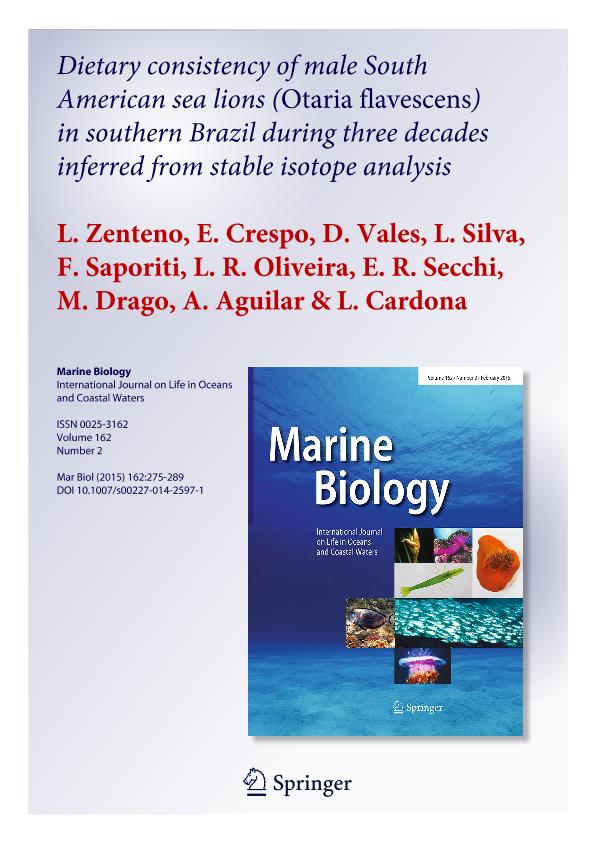Artículo
Dietary consistency of male South American sea lions (Otaria flavescens) in southern Brazil during three decades inferred from stable isotope analysis
Zenteno, Lisette; Crespo, Enrique Alberto ; Vales, Damián Gustavo
; Vales, Damián Gustavo ; Silva, Laura Alejandra
; Silva, Laura Alejandra ; Saporiti, Fabiana; Oliveira, Larissa R.; Secchi, Eduardo Resende; Drago, M.; Aguilar, A.; Cardona, Luis
; Saporiti, Fabiana; Oliveira, Larissa R.; Secchi, Eduardo Resende; Drago, M.; Aguilar, A.; Cardona, Luis
 ; Vales, Damián Gustavo
; Vales, Damián Gustavo ; Silva, Laura Alejandra
; Silva, Laura Alejandra ; Saporiti, Fabiana; Oliveira, Larissa R.; Secchi, Eduardo Resende; Drago, M.; Aguilar, A.; Cardona, Luis
; Saporiti, Fabiana; Oliveira, Larissa R.; Secchi, Eduardo Resende; Drago, M.; Aguilar, A.; Cardona, Luis
Fecha de publicación:
24/12/2014
Editorial:
Springer Verlag Berlín
Revista:
Marine Biology
ISSN:
0025-3162
e-ISSN:
1432-1793
Idioma:
Inglés
Tipo de recurso:
Artículo publicado
Clasificación temática:
Resumen
Marine predators may undergo remarkable dietary changes through time as a result of both anthropogenic and natural changes in the environment, but this variability is often difficult to tackle and seldom incorporated into ecosystem models. This paper uses the stable isotope ratios of carbon and nitrogen in skeletal material of South American sea lions from Brazilian scientific collections to investigate whether these animals modified their diet from 1986 to 2009, as reported for other marine predators in the region. Stable isotope ratios indicated that demersal potential prey were always enriched in 13C as compared with pelagic prey. Accordingly, the absence of any statistically significant correlation between stranding year and the δ13C values of adult males indicated no major increase in the consumption of pelagic prey from 1986 to 2009. Likewise, the results of the mixing model SIAR revealed a mixed diet including pelagic and demersal prey, with a central role for demersal fishes throughout the whole period. Furthermore, SIAR suggested no major changes in the proportion of pelagic and demersal prey in the diet of adult male South American sea lions during the past three decades. Demersal fishes were also relevant prey for juvenile South American sea lions during the whole period, but they always consumed a larger proportion of pelagic prey than the adults did. These results suggest no major changes in the diet of male South American sea lions during the past three decades in southern Brazil, contrary to what has been reported for other to predators in the regions and for the species in northern Patagonia.
Archivos asociados
Licencia
Identificadores
Colecciones
Articulos(CCT-CENPAT)
Articulos de CTRO.CIENTIFICO TECNOL.CONICET - CENPAT
Articulos de CTRO.CIENTIFICO TECNOL.CONICET - CENPAT
Citación
Zenteno, Lisette; Crespo, Enrique Alberto; Vales, Damián Gustavo; Silva, Laura Alejandra; Saporiti, Fabiana; et al.; Dietary consistency of male South American sea lions (Otaria flavescens) in southern Brazil during three decades inferred from stable isotope analysis; Springer Verlag Berlín; Marine Biology; 162; 2; 24-12-2014; 275-289
Compartir
Altmétricas



